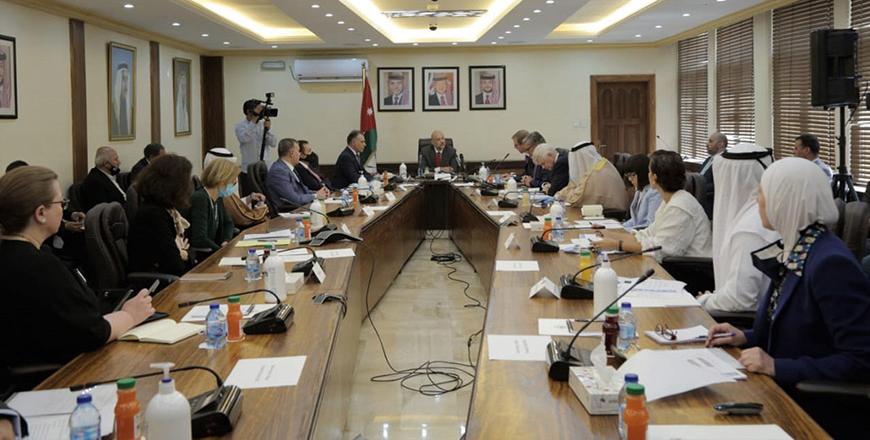You are here
Planning minister represents Jordan at Brussels IV conference sessions
By JT - Jul 01,2020 - Last updated at Jul 01,2020
AMMAN — Minister of Planning and International Cooperation Wissam Rabadi attended a number of sessions during the Brussels IV conference on "Supporting the Future of Syria and the Region", which was hosted by the European Union and United Nations and concluded on June 20.
The conference witnessed the participation of foreign ministers of 45 countries and the representatives of a number of international organisations.
During a session titled “Regional Response and Recovery in Facing the Coronavirus”, chaired by the commissioner for neighbourhood and enlargement, Rabadi said that although the COVID-19 pandemic has affected the entire world, it has impacted developing countries in particular, including Jordan, which hosts 3.6 million refugees in total and 1.3 million Syrian refugees, according to a Planning Ministry statement on Wednesday.
Addressing another session on the conditions of Syrian refugees, best practices and the required support for host countries and voluntary return, which was chaired by the director of the European Civil Protection and Humanitarian Aid Operations and the director of the Division of International Protection for the United Nations High Commissioner for Refugees (UNHCR), Rabadi highlighted the Kingdom’s role in receiving refugees and its provision of protection and living services.
Syrian refugees constitute 14 per cent of the Kingdom’s population, he said, pointing out that the Jordan Response Plan (JRP) for the Syrian Crisis for the years 2020-2022 is an "ideal model" for responding to the refugee crisis. He also highlighted that the Kingdom is "committed to refugees' voluntary return" when conditions allow it, the statement said.
During the third session, chaired by World Bank Group (WB) Vice President for Middle East and North Africa Ferid Belhaj, Rabadi took part in talks that went over the results of the WB report "The Fallout of War: The Regional Consequences of the Conflict in Syria”, which reviewed the economic and social conditions in Syria's neighbouring countries and revealed that the Syrian crisis has exacerbated and added to existing challenges, which "has resulted in increasing poverty and unemployment rates".
The last session, titled “Flexible Response in Syria's Neighboring Countries: Lessons Learned and the Way Towards the Future”, chaired by a group of representatives from the Finnish government and representatives of the United Nations Development Programme (UNDP), focused on flexible methods to respond to the Syrian crisis by assessing achievements, lessons learned and challenges, and working to overcome points of fragility.
During the session, Rabadi urged the international community and donors to provide sustainable financial support to develop institutional capacities and enable Jordan's institutions to continue providing services, according to the statement.
He added that Jordan "needs to invest in local resources" on the institutional and individual levels, highlighting the need to strengthen institutional capacities internationally and nationally.
Related Articles
AMMAN — Jordan and the international community on Monday endorsed a $6.6-billion Jordan Response Plan (JRP) for the Syrian crisis for the ye
AMMAN — Minister of Planning and International Cooperation Wissam Rabadi on Tuesday met with the United Nations Population Fund (UNFPA) Jord
AMMAN — Minister of Planning and International Cooperation Wissam Rabadi and Japanese Foreign Minister Keisuke Suzuki on Monday discus















